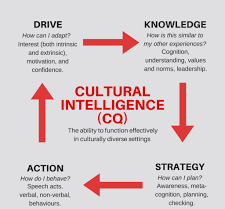Cultural intelligence is the power to be useful across several cultural setting such as ideological, organizational, ethnic, generational and national contexts. It is also an organizational and management psychology theory that suggest that getting to know the effect of a person’s cultural character background is important for good business and gauging the person’s power to effectively engage across several social contexts and environments. David Livermore defines cultural intelligence as an individual’s power to effectively function in circumstances characterized by cultural diversities. For quite a long time intelligence has been subject to controversy to many psychologists especially with its measurement. This paper therefore majorly focuses on the measurement of cultural intelligence, but then needs a scrutiny into the definition the term intelligence as used in management, due to its great effect on the possible measurement. This also makes researchers ask themselves whether or not cultural intelligence is measurable.
Despite the fact that globalization has made the universe look smaller and plain in many dimensions, the rise in cultural diversity comes with shortcomings for organizations and persons, rendering the world not that plain. Cultural intelligence has over the years attracted great attention from educationists in the field of cultural management. Due to organizational globalization and internal workforce’s diversification, knowing why some persons rise to higher levels easily. Currently many cultural intelligence empirical research and theories have concentrated on four cultural intelligence aspects and has fundamentally relied on a twenty item Scale. This cultural intelligence measure has traversed via a detailed validation procedure, and studies reveal that it is generalizable transversely in distinct cultures.
The first indication to provide a means of measuring cultural intelligence as well as its predictive validity in organizational management. Through coming up with a validated scale that assess the cultural intelligence of individuals. The efforts of Angel et al did kick start progress and significant development in empirical research on cultural intelligence though various fields such as military activities, applied linguistics, peace keeping activities, mental health, missionary operations and counselling. Livermore did leading with cultural intelligence, such tremendous advancements are reasons enough to believe that cultural intelligence has come up a long way from some theoretical idea to a measurable component with formidable psychometric attributes and control validity proof, through theoretical elucidations of concrete implication to empirical value of its prognostic validity and through an academic hypothesis to a practical layout for multicultural as well as universal development and education.
Some scholars have also found a way to measure cultural intelligence by persistently being alert others reactions. Another method is to enquire from those around us who witness our relations. Within job places for instance, asking friends, superiors and colleague’s questions regarding our cultural intelligence. Enquiring about the way we do relate with persons from different backgrounds, ages, and languages would help in measuring once cultural intelligence. One could also measure cultural intelligence via a self-evaluation technique which factors in persistent reflection on an individual’s character. Through using the persons we deal with on regular basis and whether we carefully listen to them due to similarities in communication styles. Whether we push off, speak or engage persons that have specific positions like manual workers, clerics or supervisors. Persistently measuring and re-measuring cultural intelligence is obviously not a simple task. In some cases, humans are reluctant to measure or evaluate their cultural intelligence since they are scary of being convicted. In addition, it is not enough to understand that we lack cultural intelligence but rather keeping on with that awareness and undertaking steps to effectively change.
One monumental achievement in the measure of cultural intelligence was the establishment and validation of the twenty item scale. It is true that the process stemmed up from literature reviews of related inter-cultural intelligence and competencies scales. Particularly, cognitive and educational psychology, metacognition operationalization founded a framework for aspects of metacognitive cultural intelligence. Cognitive cultural intelligence aspects were devised from pre-existing cultural contexts while motivational cultural intelligence aspects were founded from the intrinsic motivation works of previous scholars and self-efficacy applied on inter-cultural contexts. Behavioral cultural intelligence measurement ideas were drawn from inter-cultural communication studies basing on non-verbal and verbal flexibility.
One universally known measure of cultural intelligence however, is the self-report measure. The model which included four factors was backed by data gathered from United States as well as Singapore. In addition, within several studies, researchers revealed that indeed Meta-cognitive cultural intelligence was connected to performance within a decision making job and cultural judgment, and also that motivational cultural intelligence was related to overall adjustments, also that behavioral cultural intelligence foretold both general adjustment and task performances and lastly that the four cultural intelligence aspects elucidated variance in overall adjustment as well as task performance within and above that highlighted through a cognitive ability test. Modern studies have indeed affirmed that motivational intelligence foretells tasks and general adjustments.
The fact that modern research have shown tremendous milestone achievements, the measurement and construct of cultural intelligence remains reasonably fresh, and further scrutiny of its connection with connected constructs and measurement models is undeniable. This has significant impacts not only for cultural intelligence validity scores within researches but also to the assessment of the cultural intelligence studies contribution to the scrutiny of inter-cultural adaptation and transition. Some literatures have argued that studies within the context of cultural intelligence should focus on substantive and measurement aspects since the two are equally crucial in creation of the cultural intelligence validity construct.
Scholars emanating from the cultural intelligence center suggest some remedies to the measurement of cultural intelligence. Apart from the potential self-reflection models of basically imagining about individual cultural intelligence abilities, they modified the earlier model measuring cultural intelligence on four major aspects namely cultural intelligence knowledge, action, drive and strategy. It is suggested that not one model shall satisfactorily measure cultural intelligence in a valid manner because it is such a sophisticated construct. They do propose that a more complex measurement instrument should be used in measuring cultural intelligence. For instance, they came up with a cultural intelligence measure that includes video analysis and self-report information to efficiently capture the meta-cognitive ideologies of cultural intelligence.
Looking at the above literatures, it is evident that limitations exist. To begin with cultural intelligence still seems like a new idea and hence, little relevant studies exist regarding it and specifically its measurement. The scarce resources in its literature might of course affect the reliability and validity of cultural intelligence. To achieve better results in the measure of cultural intelligence it should be known that samples from many cultures as possible would be better. Also in the context of cultural intelligence it can be argued that the outcome obtained from samples of specific cultures cannot be generalized and applied to other cultures. However, this literatures still offer some valid guidance to researchers interested in the cultural intelligence field.
A few years back, steps were undertaken in the view of coming up with research programs on cultural intelligence to curb the increasing shortcomings an opportunities brought about by globalization. Nevertheless, the shortcomings faced did not hamper the journey to achieve success. Studies have been successful due to the connection drawn from research and what has been practically applied. As cultural intelligence increasingly becomes important in the daily lives of people, curiosity in bettering the scientific comprehension as well as cultural intelligence application must keep on growing. This persistent journey provides thrilling chances for researchers to come up with complex and more precise cultural intelligence models which would translate into valuable feasible recommendations for individuals and organizations.
It is my wish that insights and lessons highlighted by this paper to this extent shall trigger practical application and research by interested parties as we mutually improve our understanding of practice and science of cultural intelligence. It should be noted that cultural intelligence requires detailed scales for it to effectively measure all features of cultural intelligence. Such scales could be distinct for different settings or cultures with regard to their pertinent attributes. It should also be noted that cultural intelligence is not restricted to global interactions but rather factor in national mini cultures communications as well as cultures in various organizations. From the perspective of culture, some nations and organizations are treated as small globes and the approach of cultural intelligence could assist them respond adequately and effectively. This evidence does indeed show that there is an accepted way of measuring cultural intelligence despite the need to further improve the existing ways.




